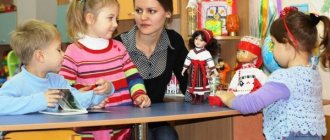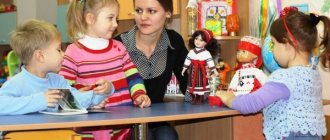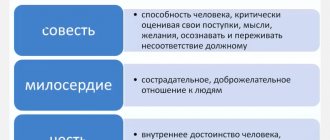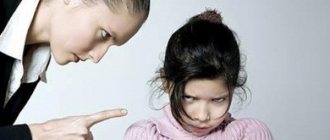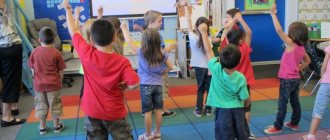Directions of moral development of preschool children
Definition 1
Moral development is the formation in a person of basic moral properties, a meaningful perception of his own personality and its place in the social environment, an understanding of his purpose and the need for continuous improvement of his personality.
Moral development is carried out in the course of moral education.
Moral education is the individual’s assimilation of the fundamentals of morality, the development of moral guidelines for behavior, the assimilation of the fundamentals of the moral functioning of society and the behavioral habits inherent in it.
Moral education is based on moral norms and principles of social behavior. It reflects the continuity of generations and the transfer of social experience.
Are you an expert in this subject area? We invite you to become the author of the Directory Working Conditions
Figure 1. Moral education. Author24 - online exchange of student work
If moral norms are a social category, i.e. they reflect the requirements of society for the behavior of an individual, his compliance with the norms of social interaction, then morality is an internal category, i.e. it is an internal regulator of individual behavior. The moral behavior of an individual in a social environment and its overall development depend on how developed this regulator is.
Moral education begins from an early age of a child. This is relevant because the behavioral habits formed in preschool age become stable foundations of human behavior throughout his life.
Finished works on a similar topic
Course work Moral education of preschool children 400 ₽ Abstract Moral education of preschool children 250 ₽ Test work Moral education of preschool children 210 ₽
Receive completed work or specialist advice on your educational project Find out the cost
The moral education of preschool children is aimed at the formation of an original personality with the skills of social interaction and self-control of behavior. The child must learn to control his actions and actions, express opinions, take into account the needs and interests of another person, develop adequate self-esteem and express his opinions and views, as well as constructively defend his interests in society.
The moral development of a preschooler is focused on the formation of his moral character. The main directions of moral development of a preschooler are:
- Formation of the pupil’s personal properties. It is necessary to create conditions for the disclosure of the natural inclinations of the individual and the disclosure of his potential.
- Moral development of personality. Here, the moral experience of a preschooler’s life is formed, and he masters the experience of social behavior and interaction.
- Developing an adequate attitude towards others: respect for other people’s opinions and points of view, acceptance of someone else’s point of view, different from one’s own, as correct, equality and equivalence of all participants in the social sphere of activity.
- Patriotic education. It is focused on the formation of civic qualities of an individual: love for the Motherland, respect for the customs and traditions of one’s people, awareness of one’s belonging to a particular culture.
- Mastering ethical standards of behavior. They reflect the values of the social environment and the rules of behavior in society, which are unspoken. They are based on the relationship between the interests of the individual and society.
In preschool age, the foundations of moral judgments and assessments are developed. The child comprehends them and learns to apply them in practical activities. In order for a child’s behavior to be formed on the basis of his conditioning by moral norms, it is necessary to organize a system of moral education that takes into account the age-related characteristics of the development of preschoolers and focuses on the social development of the pupil’s personality and his comprehensive humanistic development.
The mechanism of moral development of personality
The strength and stability of a moral quality depend on how it was formed, what mechanism was used as the basis for pedagogical influence. Let us consider the mechanism of moral development of personality. For the formation of any moral quality, it is important that it takes place consciously. Therefore, knowledge is needed on the basis of which the child will form ideas about the essence of moral quality , its necessity and the advantages of mastering it. The child must have a desire to master a moral quality , that is, it is important that motives arise for acquiring the corresponding moral quality . The emergence of a motive entails an attitude towards quality, which, in turn, shapes social feelings. Feelings give the formation process a personally significant coloring and therefore influence the strength of the emerging quality. But knowledge and feelings generate the need for their practical implementation - in actions and behavior. Actions and behavior take on the function of feedback, allowing you to check and confirm the strength of the quality being formed.
Thus, the mechanism of moral education : (knowledge and ideas) + (motives) + (feelings and attitudes) + (skills and habits) + + (actions and behavior) = moral quality . This mechanism is objective in nature. It always manifests itself during the formation of any ( moral or immoral ) personality trait.
The main feature of the mechanism of moral education is the absence of the principle of interchangeability. This means that each component of the mechanism is important and can neither be excluded nor replaced by another. What, for example, will happen if we decide to form kindness as a moral quality of an individual and begin to instill in a child only ideas about what kindness is? Or will we not evoke a positive attitude towards this quality and the desire to master it, to become kind? Or will we not create conditions for the manifestation of kindness? Assignment: Try to explain what will happen to moral quality if one of the components is excluded. Is it possible to replace it with another component? At the same time, the action of the mechanism is flexible: the sequence of components can change depending on the characteristics of the quality (its complexity, etc.) and the age of the object of education . It is clear that it is impossible to rely on understanding and awareness of the importance of developing one or another personality quality in a child of primary preschool age . But does this mean that the time has not yet come to educate him morally ? Of course not. We need to change the sequence and start not with imparting knowledge, but with the formation of an emotional base and behavioral practice. This will serve as a favorable basis for subsequent knowledge acquisition.
The first group of tasks of moral education includes the tasks of forming its mechanism: ideas, moral feelings , moral habits and norms , and behavioral practices. Each component has its own formation characteristics, but it must be remembered that this is a single mechanism and therefore, when forming one component, an influence on other components is necessarily expected.
Education is historical in nature, and its content changes depending on a number of circumstances and conditions: the demands of society, economic factors, the level of development of science, and the age capabilities of those being educated .
Consequently, at each stage of its development, society solves different problems of educating the younger generation, that is, it has different moral ideals of a person . , the education of collectivism became the most significant , in others - patriotism. Today, business qualities, entrepreneurship, etc. have become significant. And each time the ideal created by society has been extrapolated to preschool childhood , since the phrase “Everything begins with childhood” is not only journalistic and journalistic, it also has a deep scientific meaning and justification.
Tasks of moral education of preschool children
The moral education of preschool children is focused on developing their moral feelings, ideas and guidelines for social activity, as well as behavioral habits and motives for social activity.
The moral education of preschool children is focused on solving two groups of problems:
- Tasks for developing a mechanism for the moral development of a child. This group of tasks is permanent and sustainable. The mechanism of moral development is associated with the choice of forms, methods and technologies for organizing educational activities, aimed at developing moral ideals in students that correspond to a specific stage of socio-economic development of society.
- Tasks to develop certain qualities and social skills in an individual. These tasks reflect the need to achieve a certain level of development of society and meet its needs. At every historical stage in the development of society, it requires people endowed with certain qualities. Therefore, the tasks of this group change in accordance with the dynamics of the development of the social environment.
Moral education of preschoolers is focused on:
- Education of the fundamentals of cultural behavior and cultural interaction in the social environment;
- Developing collective interaction skills;
- Education of the fundamentals of humanism and humane qualities of the individual;
- Fostering hard work;
- Nurturing patriotic qualities.
Psychological aspect
Raising children is inextricably linked with psychological concepts. How a child’s cognitive skills and abilities are formed is an important component of the entire process of learning and upbringing.
From a psychological point of view, the approach to preschoolers should be based on the following principles:
- patient attitude towards the individuality of each participant;
- understanding the child’s characteristics;
- accepting the child's characteristics.
The preschool period is the most important part of childhood, which is closely related to the instability of emotions in children, incomplete understanding of their role and requirements for behavior.
A set of techniques and techniques that are used in preschool institutions helps children understand which forms of communication are sustainable and which are undesirable in society or the family.
Examples of activities with preschoolers
The spiritual and moral education of preschool children within the framework of the Federal State Educational Standard in practice consists of successive classes, practices, and techniques. They are applicable both at home and in groups at a preschool institution.
Lesson "Family"
The teacher prepares handouts, compiles a questionnaire and organizes the children. After the introduction, the teacher asks the children questions about their parents, brothers or sisters. The teacher tells children about the importance of family, adjusting the information based on age.
Children dance in a circle and then sit on chairs. The teacher shows the children animal cards. Children guess who is whose mother. Completion of the lesson: after the teacher’s question, the children tell what they are called at home, what affectionate names they know.
Spring forest
This lesson introduces primary schoolchildren to the names of trees and natural features. At the beginning of the lesson, the teacher suggests going to the spring forest, but says that this will require using your imagination.
Lesson “Journey to the spring forest”
Children move to a location decorated with decorations and auxiliary materials. The teacher points to the models one by one and asks the children to name what they see. It is convenient to use a forester doll in this lesson, who will talk about the forest and give tasks.
Examples of tasks:
- draw a dandelion;
- remember the poem about spring;
- solve riddles;
- Bring the forester the objects he describes.
At the end of the lesson, the forester thanks the children for their knowledge and help. Separately, he gives a lecture on how important it is to protect the forest and appreciate nature.
Know yourself
The lesson is based on associative techniques. Analogies can be different designs, but it is most convenient to use the example of the structure of a car and the human body.
The teacher demonstrates the machine to the children, shows it in cross-section and asks them to say what the machine cannot work without. Children should gradually conclude that the car needs gasoline. The teacher draws an analogy with a person, tells how blood flows, asks to say what a person cannot live without.
The result of the lesson should be the formation of simple analytical thinking when children learn:
- compare animate and inanimate objects;
- draw analogies;
- take tasks not literally, but learn to reason and think abstractly.
Depending on the age of the children, you can ask arguments on different topics, supplementing it with more complex examples.
Fish
An interesting activity that introduces children not only to the characteristics of fish, but also teaches how to treat them with care. An aquarium is required for this activity. The teacher asks the children to formulate their questions for the fish and ask them through the wall of the aquarium.
Children must conclude that fish cannot talk. Then the teacher reads a letter on behalf of the fish, where it asks riddles and talks about its characteristics: the structure of the body, the presence of a tail, scales.
Integrated lesson “Water”
For the lesson you will need auxiliary materials: dolls and small basins of water.
First, the teacher conducts language and articulation gymnastics, where he asks the children to alternately touch their eyes, nose, ears, and forehead. Then he talks about how important it is to wash your face morning and evening. The cartoon “Moidodyr” can serve as demonstration material.
After this, the children, at the teacher’s command, begin to wash their dolls. They help each other in the process. The final stage is reading poetry, accompanied by active motor actions.
The teacher talks about how important water is for a person, what needs to be done to learn how to save resources , how it is customary in society to take care of nature in order to keep rivers and lakes clean.
